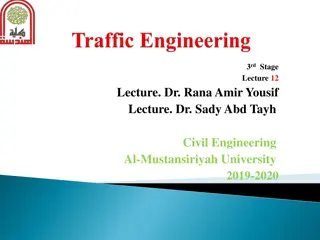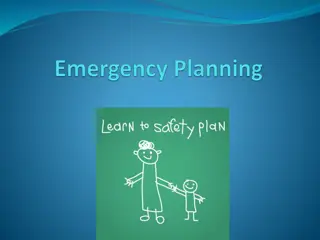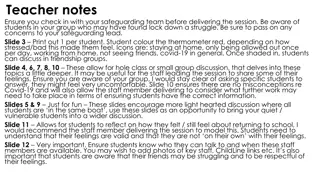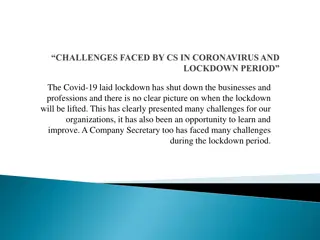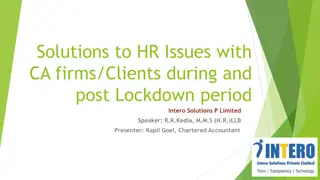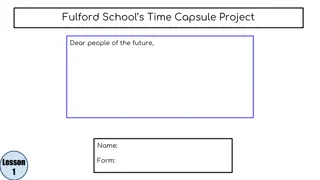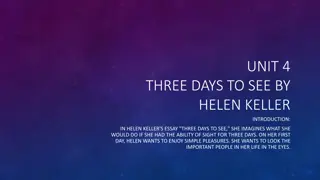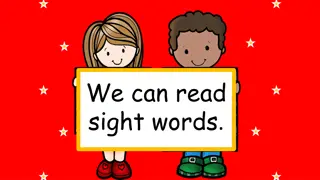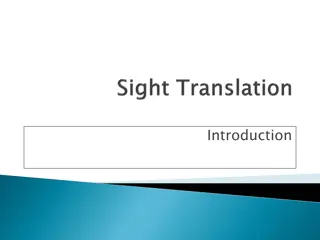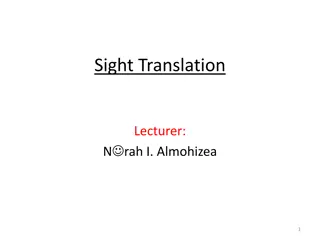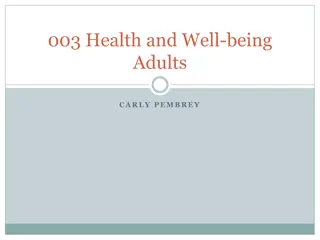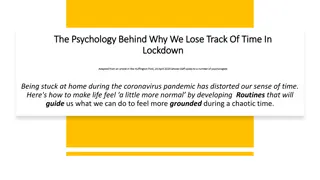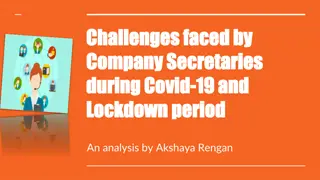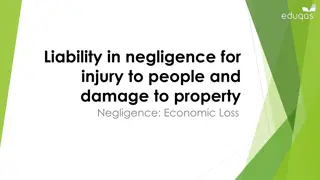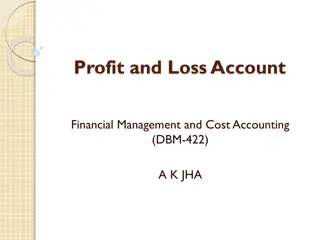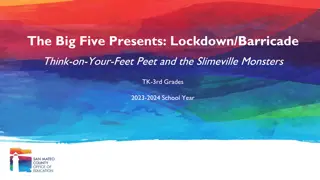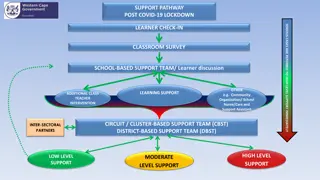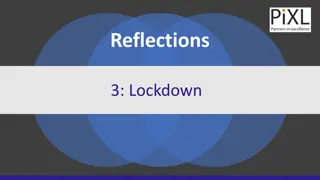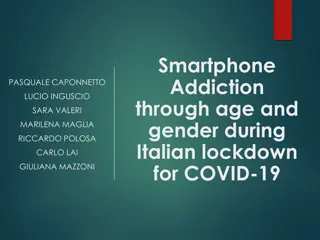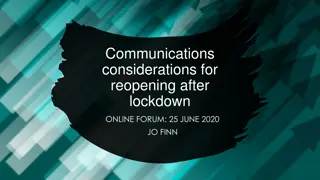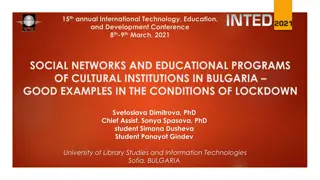Insights on Living with Sight Loss in UK Lockdown
The report addresses the challenges faced by blind and partially sighted individuals during the lockdown in the UK due to the COVID-19 pandemic. It highlights difficulties in accessing essentials like food and shopping, with a reliance on others impacting independence. Recommendations focus on improving support for this vulnerable group.
Download Presentation

Please find below an Image/Link to download the presentation.
The content on the website is provided AS IS for your information and personal use only. It may not be sold, licensed, or shared on other websites without obtaining consent from the author. Download presentation by click this link. If you encounter any issues during the download, it is possible that the publisher has removed the file from their server.
E N D
Presentation Transcript
Voice of the Customer and Innovation Living with Sight Loss in Lockdown in the UK Key Insights and Recommendations for our external partners Authors: Tracy Dearing and Firuze Bertiz RNIB Design and Evaluation Team
Introduction The Coronavirus outbreak has had a huge impact on the lives of everyone living in the UK. However, blind and partially sighted people have had to face their own unique set of challenges as a result of the virus. Living with Sight Loss in Lockdown was a six-week research programme designed to listen to the experiences and opinions of blind and partially sighted people throughout lockdown, via a series of focus groups and surveys. The research was concluded at the end of June 2020, just as the UK Government began to gradually ease some of its lockdown restrictions in England. This report summarises our findings from this research and offers a set of interim recommendations for RNIB to consider on how to address key challenges experienced by blind and partially sighted people during the ongoing Covid-19 crisis.
Experiences of going into and adapting to lockdown
Getting access to the essentials (shopping) As the UK went into lockdown, like everyone else, people with sight loss were concerned about how they would access the basics. All participants in our focus groups mentioned that they found it extremely difficult to access food and shopping in the early days of the pandemic. Over a third (39%) of respondents to our quantitative survey (out of a total of 340) reported that they were still very or quite concerned about accessing food or groceries two months into lockdown. Respondents who were registered blind were slightly more concerned than those registered partially sighted, with 41 per cent expressing concern compared to 35 per cent of partially sighted respondents. As people began to adapt to life in lockdown, participants acknowledged that most supermarkets had made some improvements. However, despite these changes, shopping remained to be a stressful experience for people.
Getting access to the essentials (shopping) On the whole, participants reported that due to the challenges they have been experiencing around social distancing in supermarkets, they have been relying on their sighted friends or family members more than ever before to help them shop. This reliance on others has in many cases left people feeling uncomfortable or embarrassed and some have felt that it has resulted in them losing their independence. These findings were supported by our Coronavirus survey, here results revealed that, since lockdown, 80 per cent of respondents (out of a total of 471) have changed the way they access essential food shopping. Overall, a higher proportion of participants (49%) said they were relying on someone else to do their shopping for them (in comparison to 18% prior to the lockdown); and a lower proportion of participants (14%) said that they were able to shop independently (in comparison to 28% prior to the lockdown).
Getting access to the essentials (shopping) Shopping's been a big thing for me really difficult thing because at the moment I'm not able to get out so my friends go once every two weeks for me, and they've just come back and waved a shopping list at me the list of things that [they] couldn't get If you go yourself and they haven't got one thing, you can pick up something else [so] I was kind of thinking well, what about shampoo? Focus Group 2 Participant
Getting access to the essentials (health) During lockdown, over a half (53%) of survey respondents (out of a total of 68) reported that they required access to health services such as GPs and eye clinics. Findings from our survey and focus groups indicate that most blind and partially sighted people were offered remote consultations with a health professional during the lockdown, which they have appreciated. However, some participants reported that remote consultations were not necessarily appropriate for the problems they were experiencing, particularly issues relating to their eyesight, which they felt required a physical examination. Thus, they were waiting for the lockdown to be over to access the support they need.
Getting access to the essentials (health) I phoned up and said Could you tell me what the procedure is for when I attend this appointment? And they went Oh no, it s cancelled. Well, communication-wise it was appalling, and I still haven t had a cancellation letter even now. I ve still not had any communication from them at all. Focus group 1 Participant when I went to the hospital I found it really difficult because they d got a barricade to stop you getting close to the desk, so I wasn t sure who was speaking to me They d changed where the clinic was, so I was in a different place Normally, when I go to that hospital they have somebody there that can take you. I m usually very, very independent but I feel like I won t get the assistance I ve had in the past. Focus Group 2 Participant
Access to information Access to information is a unique issue for blind and partially sighted people and despite the Equality Act, people have struggled to get information in a format they can read. Survey findings revealed that throughout the lockdown period, almost a third (31%) of respondents (out of a total of 348) have struggled to access the information they have needed about the pandemic in a format they could read, some or all of the time . People have predominantly relied on the UK Government s daily briefings to stay informed about the pandemic, via TV and radio broadcasts. As blind and partially sighted people started to settle into lockdown, some focus group participants received written information and guidance about the pandemic from their local authority in the post. However, this information had arrived too late and was not in a format, they could read.
Access to information Moreover, assets that could be used to make reasonable adjustments have been underutilised throughout this crisis, including the communications needs collected by the NHS and Local Authorities to comply with the NHS England Accessible Information Standard (AIS) and the Registers of Blind and Partially Sighted People held within Local Authorities. I do think what should have happened is Councils should have looked at their registered people and sent out all the correct information to people or at least check what format people need in 'cause they would have the information Rather than relying on blind people to get the news from, well, TV or whatever. Focus Group 2 Participant As we moved out of lockdown, daily briefings were found to become vague and unclear. Without a reliable source of accessible information many focus group participants have found it a challenge to get the guidance and information they need to stay safe and help them get out and about.
Access to information I am a very independent person but feel disempowered by the lack of accessible information that has been sent out regarding Covid-19. It feels like people with sight loss are being left out. I feel like we've been treated as if we don't exist. It's almost expected that everyone has access to the internet which not everyone does. Focus Group 2 Participant I had a letter from my County Council. It was about four pages of double-sided print and it's all inaccessible 'cause the print was so small and I sort of gave up after the first paragraph 'cause I really struggled to read it. Focus Group 2 Participant
Digital technology as a saviour Our findings show that digital technology has played an vital role in helping people with sight loss to adapt to life under lockdown, with many focus group participants describing it as a saviour during the crisis. More specifically, just over three quarters (77%) of participants (out of a total of 116) reported that they have been using phone calls to stay in touch with others during the lockdown; whilst over a half (57%) have been using video calls (e.g. via Zoom or WhatsApp); and, over a quarter (26%) have been using social networking sites such as Twitter or Facebook. This supports our quantitative survey findings which showed that 92 per cent of blind and partially sighted people (out of a total of 136) have found technology to be helpful in terms of work and staying in touch with family and friends.
Digital technology as a saviour Many participants in our focus groups cited the iPhone and Alexa as pieces of technology that have made the most difference to their lives prior to and during the lockdown period. This was supported by findings in our quantitative survey where 50 per cent of respondents (out of a total of 132) reported that mainstream devices such as tablets and smartphones have been the most helpful pieces of technology to them during the lockdown, with only 6 per cent reporting that specialist technology such as JAWS (a computer screen reader) has been useful, and the remaining 44 per cent relying on a mix of both. These devices allow them to access a variety of things to support their independence, all from one place , such as helping them to read and access news , buy food or groceries, manage their finances and engage in leisure activities. Most acknowledged that, since the lockdown, they have become more reliant on digital technology to support their independence.
Digital technology as a saviour I have an iPhone, it s more than a phone, I don t think calling it a phone tells the story, it is a personal computer. If I count what I do on my phone from getting up in the morning until I go to bed, making a phone call is probably the least important. I do all sorts of other things on it like banking and social media and all sorts of other things Focus Group 1 Participant I use it from morning until evening really, looking for information, talking to people and also social media. Yesterday I just came across like a radio show and they had a movie night and I just joined and it s quite simple to put on because I ve got Apple Music Focus Group 1 Participant
Digital technology as a saviour Nevertheless, our findings suggest that some blind and partially sighted people may be left behind because they do not know about digital technology, have access to it or the confidence to use it. There's an awful lot of people out there that are maybe a little older than us They haven't got the technology There s something around technologies that becomes a bit of a phobia to some people, and we got to try and work on that Trying to educate them... One of the things that could be done that s helpful is if you can get training out of people in the communities to train others. Focus Group 3 Participant Furthermore, blind and partially sighted people have been hampered by the lack of accessibility built into technology, particularly with more and more services being offered remotely due to lockdown restrictions.
The impact of lockdown on blind and partially sighted people s emotional wellbeing
Emotional Wellbeing Unsurprisingly, the lockdown has had a detrimental impact on blind and partially sighted people s overall wellbeing. Findings from our quantitative survey have shown that just under a half (49%) of participants (out of a total of 290) felt that their emotional wellbeing had worsened due to the Coronavirus.
Emotional Wellbeing loss of independence Overall, both quantitative and qualitative findings from our research indicate that the lockdown restrictions have had a negative impact on blind and partially sighted people s autonomy and freedom to get out and about safely. Just over half (54%) of survey participants (out of a total of 351) reporting that they felt less independent in their day to day lives due to the pandemic, and just over a half (54%) (out of a total of 94) reporting that their sight loss was stopping them from getting out as much as they would like during lockdown. Findings from focus group show that this loss of independence has inevitably contributed to feelings of loss, anger and sadness.
Emotional Wellbeing feelings of isolation Unsurprisingly, the lockdown has had a negative impact on peoples social connections. Focus groups revealed that, despite finding some new ways to stay in touch with others. Many participants were missing the everyday interactions they were accustomed to and have, at times, felt isolated and cut off from the rest of the world. Our survey results show that, during the lockdown period, over a third (40 per cent) of blind and partially sighted people (out of a total of 126) have had less contact with the people that matter to them most; and, one in ten (9%) have had very little contact with their friends and family members. As much as it s nice to catch up with people on Teams and Zoom, it s not quite the same as meeting people face-to-face, having a chat and a catch up, and a laugh. I I like being with a group of people. Focus Group 2 Participant
Emotional Wellbeing services and support Many blind and partially sighted people do not know where to go for support to maintain their physical and mental health . I ve been surprised how people haven t been in touch it s more what I can do for other people than what they can do for me really to be honest.. I think I would have liked maybe a nice phone call from someone, whether it was the church or even work, you know, someone to call round and say, how are you managing, how are you going to manage. Focus Group 2 Participant Some have felt disappointed with the lack of overall support and understanding they have received from family members and friends during this time. We also found that the value of peer to peer connections is immense.
Emotional Wellbeing resilience While emotional wellbeing has been detrimentally affected for many blind and partially sighted people our quantitative survey does indicate that over a third (39%) of participants (out of a total of 275) are experiencing the same or better levels of wellbeing. To be honest I ve been through worse things than this. It wasn t a walk in the park, but I do find that people with disabilities I think throughout the years you do build up, there is a thing that people think it s doom and gloom, you think oh no I can do things. You have to focus on what you can do and not what you can t do. Focus Group 3 Participant Many participants felt that their experiences of living with their eye condition had provided them with the resilience for a life of in lockdown (constantly adapting and adjusting to new challenges and situations).
Conclusions and preparing for life after lockdown
Access to information key insight Access to information is a unique issue for blind and partially sighted people in a visually mediated world. Boris Johnson s letter did arrive but not in an accessible format at all. My 12 weeks stay at home letter wasn t in an accessible format my GP surgery did ring and offer to read it to me over the phone... I think they were doing the best that they could under the circumstances. But, should we face anything like this again, I do think that there needs to be measures in place... Focus Group 1 Participant Despite the Equality Act 2010 and Care Act 2014 placing a duty on the UK Government and local services to provide reasonable adjustments, the provision of accessible information to keep people informed about the pandemic has been and remains poor.
Access to information what next? We have already started to work with the UK Government, the wider public sector and sight loss organisations to improve access to information. We would like to continue and expand this to: Develop a means of gathering and communicating relevant national and local information to blind and partially sighted people through collaborating and working together with partners in the public sector and wider sight loss sector, so that we could reach more people quicker. Explore potential for local and national sight loss organisations to jointly develop relationships with key individuals and departments (such as libraries, rehabilitation and education services) in local authorities with responsibility for people with sight loss, including gathering knowledge on where these relationships already exist and learning what works well, so that productive relationships are nurtured, supported and respected. Consider establishing a sector crisis response plan with resourcing.
Access to information what next? We have already started to work with the UK Government, the wider public sector and sight loss organisations to improve access to information. We would like to continue and expand this to: Promote the use, maintenance and quality of the Registers of Blind and Partially Sighted People held within local authorities. Explore how a Tell Us Once system for people with sight loss declaring their preferred format (which is then shared with all statutory authorities) might work. Work with the UK Government to secure the systems and capabilities to embed accessibility into public sector communications, ensuring obligations under the Equality Act, Care Act and NHS England Accessible Information Standard (AIS) are followed, and measuring the impact of this on blind and partially sighted people. Ensure that the review of the NHS England AIS results in blind and partially sighted patients receiving health information in their preferred format.
Going out and social distancing key insights Overall, our participants felt that social distancing guidelines have been designed for the mainstream and do not take into consideration the accessibility needs of blind and partially sighted people. All of a sudden the kinds of systems that I used to use were no longer applicable queue outside and spray your hands and follow a one-way system in the shop and a 2- metre distancing round the till all these things were totally inaccessible to me. Even finding the queue was a nightmare because people just don t want to speak and you re there trying to find out where the end of the queue is. Focus Group 1 Participant People were concerned about their ability to socially distance, worried about how others would perceive them and feared they would no longer be able to rely on the goodwill and support of the public when out and about.
Going out and social distancing key insights As such, participants felt that it was more important than ever to educate the general public about the challenges faced by blind and partially sighted people when they are out and about in public spaces. I went to the bank this morning and asked this guy would he look at my phone for me, and he just run away from me and said no, I m not touching that I didn t like it. I mean he was at the door as well. There was something on there I needed him to double tap on and he just refused to do it when this finishes, I don t think people are going to be the same Focus Group 1 Participant In response to RNIB s campaigning, the Department of Health and Social Care (DHSC) has now produced guidelines on how people with sight loss can be supported by others outside their home. In particular, this applies to sighted guiding, making it clear that sighted guiding is permitted if people take the right steps to reduce risk.
Going out and social distancing what next? We would like to continue to work with the UK Government to: Run a public understanding campaign that highlights that some people may find social distancing more difficult than others, meaning it is everyone s responsibility to socially distance. As part of the campaign, the RNIB-endorsed, pan disability social distancing indicator should be promoted. It is vital that the wider public recognise these symbols and take more direct responsibility for social distancing themselves. Make sure service providers, particularly retailers and transport providers are aware of the DHSC s new guidance that permits sighted guiding. We re always accountable and responsible for making sure we ask for help and ask for assistance, and asking for what we need, and promoting this and that, but shouldn t there be a social responsibility for people to think about other people in society and take a bit of responsibility as well. Focus Group 1 Participant
Going out and social distancing what next? We would like to continue to work with the UK Government to: Ensure that Equality Impact Assessments are conducted both on large and small scale-built environment projects and that the voice and experiences of blind and partially sighted people are represented within these. Ensure the needs of blind and partially sighted people are considered in approving licenses for furniture to be placed outside premises. Ensure the impact of e-scooter trials on blind and partially sighted people are fully captured in the evaluation, including where disabled people have self-excluded from trial areas because these are no longer accessible to them.
Support people to gain confidence key insights Blind and partially sighted people s confidence has eroded the longer lockdown went on. I think there ll be a long period of gradually adapting and for some they ll struggle to get back out and live anything like the independent lives that they were used to, or to adapt to a new circumstance ... think that s the thing that really does concern me Focus Group 3 Participant Constantly needing to adapt to new rules and measures has made the new normal a less certain place for many people with sight loss. Participants felt that it was important that blind and partially sighted people were supported by sight loss organisations or rehab services to adapt, for example to gain experience and new skills and to help plan journeys through the new lockdown world.
Support people to gain confidence key insights Evidence suggests that support to adapt and build confidence would be especially important for those who have been shielding; who have lost the support of personal assistants; and, are new to sight loss. feel like I ve gone 10 steps backwards. I don t know if that s because of the shielding letter or my tolerance is lower. I want to be able to pick up from where I left off, and I really hope we can do this I m not normally one to feel vulnerable, but I do feel vulnerable, and it s not a nice feeling when you re not used to feeling vulnerable. I don t feel ready. Focus Group 1 Participant
Support people to gain confidence what next? In response to these findings: RNIB have developed guidance jointly with the Rehabilitation Workers Professional Network, Guide Dogs, Thomas Pocklington Trust and Visionary, which has been issued to Local Authority rehabilitation teams through the Association of Directors or Adult Social Services network. The guidance offers advice and encouragement to teams on how to start re-engaging with blind and partially sighted people in their areas, especially those new to sight loss. We would like to work with the wider sight loss sector to help us promote this guidance. There is also a need for UK Government to make sure that rehabilitation services are sufficiently resourced locally. Moreover, RNIB have developed guidance on the use of face coverings by blind and partially sighted people.
Support mainstream providers key insights Our findings indicate that, overall, the efforts and strategies adopted by people with sight loss to support their independence are not understood or recognised by many essential service (including healthcare services, transport providers and the retail and hospitality sector). It d be a nightmare if we couldn t get assistance anymore. I rely on assistance a lot, it d be a nightmare if people weren t there to guide you anymore. Focus Group 1 Participant Moreover, service providers are not always adhering to their duty to make reasonable adjustments under the Equality Act.
Support mainstream providers key insights Service providers are predominantly using visual signs and cues (e.g. posters, stickers on the floor, etc.) to enforce social distancing rules within their premises, without making any reasonable adjustments to communicate these cues to people with sight loss. How am I going to know that it says bus full? I m not going to know That s not okay. It s absolutely not okay, and I think that the charity has an obligation to get education out there, to educate them as to why this is not okay there is a lot of work to be done The Equality Act is still there. It s still a duty for organisations to make reasonable adjustment, regardless of whether there s a Coronavirus or not Focus Group 1 Participant Furthermore, individual staff members or managers make their own interpretations of the Government s advice and there is no consistency in terms of how blind and partially sighted people are treated or what they can expect.
Support mainstream providers what next? I found that the major supermarkets they were an absolute disaster, I mean really, really awkward, and we couldn t get a delivery slot for, like, weeks and weeks. And you couldn t contact them there was no way to speak to a human... me and my partner were sitting there, basically, frantically Googling and researching on local Facebook pages and Twitter and figuring out who s delivering, who s not, who s recommending, who s not recommending and other sort of groups for blind and partially sight people and see what they were saying, following any hints and tips. Focus Group 1 Participant In response to these challenges: RNIB quickly developed new relationships with Defra and worked with them to open priority home delivery slots for blind and partially sighted people who need them. We would like to continue to develop and maintain our positive relationship with Defra and work together with them to ensure people with sight loss gain access to essentials should there be another UK-wide lockdown.
Support mainstream providers what next? Furthermore: RNIB have developed guidance for businesses and essential services to increase understanding of how people with sight loss are affected by the new social distancing rules. This guidance offers practical solutions, which will help services meet their obligation to provide reasonable adjustments under the Equality Act, enabling blind and partially sighted people to better adapt and work around a visually mediated world. We would like support from the wider sight loss sector and UK Government to help us promote this guidance. Moreover, we would like the UK Government to incorporate our key advice into the guidance they have produced for different sectors and service providers.
Support mainstream providers I think working with companies on training or guiding them towards where to get the right training for staff, I think training has always been lacking for certain sectors and I think now maybe is the time to focus our efforts in that direction I think that the pandemic has made me feel less independent and I want things to be in place to make me feel independent again. Focus Group 1 Participant
Wellbeing key insights Unsurprisingly, the lockdown has had a detrimental impact on blind and partially sighted people s overall wellbeing. [It] really frightens me, not being able to socially distance because I can t judge that distance, and maybe having to get that additional support that for me would feel like giving away a bit of my independence because I can t do the socially distancing thing, and because things have changed. It is something I am wrestling with. Focus Group 1 Participant People have felt that they have lost their freedom and independence to get out and about by themselves, with many pointing out that their whole world has shrunk as a result of the lockdown restrictions. People have often felt isolated due to not being able to see their friends and family members in person.
Wellbeing what next? We would like to work with the UK Government, the wider sight loss sector and public and mental health services to: Promote and engage with research exploring the impact of sight loss on mental health and emotional wellbeing. Work together to develop an integrated support pathway from the point of diagnosis into funded emotional support services (e.g. facilitated peer group support, counselling, etc.) Build the capability of mainstream providers to deliver emotional support and counselling to people who have lost sight. Ensure blind and partially sighted people know about and have access to the services they need to help them maintain their wellbeing and increase resilience.
Importance of Digital Inclusion key insights if we re being expected to do more online, or that s the way we re going to be living our lives RNIB need to be campaigning to make sure that a) it s accessible, b) people have the means to do it, so digital inclusion, and c) that they ve got the skills to do it or that they re campaigning for training. I don t expect RNIB to deliver it all because that would be a monumental task, but at least to campaign to ensure enough people are given the chance because otherwise we re going to be left behind. Focus Group 2 Participant Our findings show that digital technology has played an important role in helping people with sight loss adapt to life under lockdown, with many focus group participants describing it as a saviour during the crisis. Furthermore, digital technology will play a crucial role in helping people navigate life in the new normal.
Digital Inclusion what next? We would like the UK Government to include us: In the UK Government s digital inclusion strategy to make sure that people with sight loss are included in any plans around digital inclusion and that there are clear actions for service providers to ensure accessibility is built in from the outset. In the development of the UK Government s disability strategy, particularly as it closely relates to digital accessibility. I don t think I d have been able to cope without Zoom, FaceTime, Skype and all those sorts of things. We talked to America. We talked to Australia. We talked to different places, so it's lovely. Focus Group 3 Participant
Working during lockdown and beyond key insights Overall, our findings show that, due to the uncertainties surrounding the future of work practices, people with sight loss are anxious and worried about going back to their usual work environment. I think there is going to be a massive redundancy package from a lot of organisations and I still think blind and partially sighted people are going to be at the front of that. So what support is going to be available for those people in terms of looking for a new that s where there is going to be a gap. Focus Group 1 Participant Most are concerned that employers will not be understanding of their new accessibility needs, and worry that their jobs may be at risk.
Working during lockdown and beyond key insights Having said this, digital technology has proven to be a key enabler in helping people with sight loss to continue working from home successfully. I would recommend that actually more working from home should actually work in our favour. In that we rely a lot on technology and technology can give us a lot of advantages potentially and hopefully if society can realise that maybe some of our disadvantages are lessened. Focus Group 3 Participant This presents new opportunities, flexibility and choice for people with sight loss in the new world of work.
Working during lockdown and beyond key insights RNIB would like to work with employers and employment support professionals to: Develop a strategy which works to specify and address the challenges around retaining work in the current economic environment and increases the opportunities for employment of people with sight loss in the long term. Ensure that UK employers understand the impact of the pandemic on people with sight loss and that they are equipped to provide reasonable adjustments to their employees in the new normal . It is also vital that the UK Government s new disability strategy looks at the specific needs of blind and partially sighted people in the workplace, developing clear actions on both recruitment and retention.
Our approach Focus groups Three sets of focus groups were held on a weekly basis (between 11th May and 16th June 2020). In total, 17 people with sight loss participated in our 2-hour sessions, which were facilitated remotely via Microsoft Teams. A majority (12) of these participants were registered as severely sight impaired (blind) and 5 were registered as sight impaired (partially sighted). 11 participants were aged 45 years or above and 6 were aged under 45 years.
Our approach Survey A survey was conducted for a six-week period between 14th May and 24th June 2020. Questions in the survey s changed each week in line with topics being discussed in the focus groups. The survey was mostly conducted online via RNIB s customer panel (Connect Voices), our external website and via social media. Some responses were also collected through wellbeing calls to RNIB customers, via the telephone. A total of 235 complete responses were collected through the online survey and a further 220 responses were collected through telephone calls, many as a shorter, abridged version of the full online survey. This resulted in a total of 455 responses. Some of the most engaged respondents in Connect Voices returned to answer the survey each week. The total unique respondents surveyed is around 400.
For more information contact: Tracy Dearing Design and Evaluation Insight Manager tracy.dearing@rnib.org.uk Tele: 07766773206


